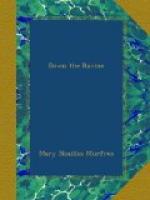If she were “powerful peart,” it was a fact readily apparent only to him, for she was a silent child, with the single marked characteristic of great affection for her eldest brother and a singular pertinacity in following him about.
“I dunno ’bout Tennie’s peartness,” his mother sarcastically rejoined. “’Pears ter me like the chile hain’t never hed good sense; afore she could walk she’d crawl along the floor arter ye, an’ holler like a squeech-owEL ef ye went off an’ lef’ her. An’ ye air plumb teched in the head too, Birt, ter set sech store by Tennie. I look ter see her killed, or stunted, some day, in them travels o’ hern.”
For when Birt Dicey went “yerrands” on the mule through the woods to the Settlement, Tennessee often rode on the pommel of his saddle. She followed in the furrow when he ploughed. She was as familiar an object at the tanyard as the bark-mill itself. When he wielded the axe, she perched on one end of the woodpile. But so far, she had passed safely through her varied adventures, and gratifying evidences of her growth were registered on the door. “Stand back thar, Tennessee!” in a loud, boyish halloo, was a command when danger was ahead, which she obeyed with the readiness of a veteran.
Sometimes, however, this incongruous companionship became irksome to him. Her trusting, insistent affection made her a clog upon him, and he grew impatient of it.
Ah, little Sister! he learned its value one day.
The great wood fire was all aflare in the deep chimney-place. Savory odors came from the gridiron and the skillet and the hoe, on the live coals drawn out on the broad hearth. The tow-headed children grew noisy as they assembled around the bare pine table, and began to clash their knives and forks.
Birt, unmindful, crouched by the hearth, silently turning his precious specimens about, that he might examine them by the firelight. Tennessee, her chuffy hand on his shoulder, for she could reach it as he knelt, held her head close to his, and looked at them too with wide black eyes. His mother placed the supper on the table, and twice she called to him to come, but he did not hear. She turned and looked down at him, then broke out sharply in indignant surprise.
“Air ye bereft o’ reason, Birt Dicey! Ye set thar nosin’ a handful o’ rocks ez ef they war fitten ter eat! An’ now look at the boy—a stuffin’ ’em in his pockets ter sag ’em down and tear ’em out fur me ter sew in ag’in. Waal, waal! Sol’mon say ef ye spare the rod ye spile the child—mos’ ennybody could hev fund that out from thar own ‘sperience; but the wisest man that ever lived lef’ no receipt how ter keep a boy’s pockets whole in his breeches.”
CHAPTER II.
Birt Dicey lay awake deep into the night, pondering and planning. But despite this unwonted vigil the old bark-mill was early astir, and he went alertly about his work. He felt eager, strong, capable. The spirit of progress was upon him.




